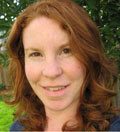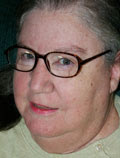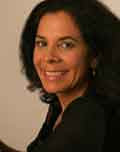“Hmm, the dog walker’s havin’ fits with Buster again,” Jesse said, peering intently out the dining room window that faced the street.“Watch. He’ll break free. See!”
A compact, big-boned blonde in a pink jumpsuit wrestled with a tangled mass of rope hooked to three Rottweilers. A fourth frothy beast veered off from the pack, untethered.
“And Becky will dive on him as if she were ropin’ a steer,” Jesse continued, bemused. Sure enough, the woman skillfully nabbed her elusive prey.
“How do you know her name?” I asked.
Jesse, riveted to the neighborhood scene, didn’t hear me or didn’t want to answer. I shifted in my chair uncomfortably, sitting across from him, my wife Lynda, and her 95-year old grandmother, who needed constant supervision as of late. Various family members had agreed to take turns watching this feisty matriarch, who vowed to live at the Pasadena ranch home built by her late husband some 60 years ago. This week, her son Jesse served as nursemaid, paying a rare visit from Arkansas. We made the trek from Torrance to cook dinner for them. Lynda never talked much about her uncle, except that he was a Vietnam Vet and hunted anything that moved, including squirrel. I had no idea what he did for a living.
“5:15. That hot Asian masseuse gonna pull up right…about…now,” Jesse announced, snapping his fingers. Sure enough, a silver Celica stopped just shy of the house with an attractive black-haired woman behind the wheel.
“Just come from Drummond’s house,” Jesse said, smirking. “He calls her a ‘physical therapist.’ Uh-huh.”
“Pete Drummond. On Washington near the library,” Iris muttered, her memory as shaky as the finger pointing toward a house on the corner. “Fell off the…the…”
“The roof. I remember that,” Lynda chimed in. “Gosh, how long ago was that? Thirty years? But he didn’t seem so bad off at the time. You’d think by now…”
Jesse hushed us.
“Now I figure she done stop to pull herself together,” he assessed. “Crosses herself, takes a deep swig off a plain wrapped container. Pounds the dashboard. Big deep breath, then takes off.”
As the Celica sped away, I shifted uncomfortably again, trying to figure out what was more odd: the mysterious driver or Jesse’s acute observations. At 60-something Jesse looked rugged and fit. Clean-shaven. Short dark hair with only a hint of gray. Oozing with Southern hospitality. Had all his teeth. Maybe if I knew more about his background…
Iris suddenly coughed violently. Lynda instinctively jumped to her side.
“You okay, Grandma?” she said with alarm.
She coughed again, her frail frame ready to break apart like brittle candy.
“I’ll get some water,” I said, bolting for the kitchen.
“She’ll be fine,” said Jesse calmly. “Happens a couple times a day.”
When I returned, Iris was sipping a juicebox. I must have missed that.
“Got it covered, but thanks anyway, Brad,” Jesse said.
“Oh,” was all I could muster, staring dumbly as he dabbed Iris’s mouth with a napkin. She sniffed the air suspiciously.
“What’s that smell?”
“I brought your favorite, Grandma,” Lynda said, leaning into her. “Roast turkey and dumplings.”
“Oh, aren’t you the sweetest,” Iris said.
“Much better than what Josie’s been carting home,” Jesse said, pointing to the house directly across the street.
“Josie?” I asked.
“Take-out, every night I been here,” Jesse explained. “Mostly Church’s fried chicken. And guessing by her slim figure, she don’t eat it. Just her husband, who shuffles in come ten, eleven from working at Target. Pulling in the driveway now, check it out.”
I stared at Lynda, whose look of concern was now matching my own. What’s with this guy? His Peeping Tom antics were starting to creep me out.
“Now she’ll get out of the car, but won’t go in the house,” he continued. “Not until she goes to the truck, grabs the sunshade for the dash. Never mind that it’s overcast.”
Lynda tried to change the subject. “Hey, Jesse, have you heard from your wife since you been here?” she asked, but he ignored her. He relished playing puppeteer to all the action in the neighborhood.
“Now here’s the sad part,” Jesse said. “Frank Beecham next door sees Josie and walks over to say hello. But she’ll completely ignore him and make a beeline for the house. Some bad blood there.”
We all were caught up in this voyeuristic scene. I couldn’t help feeling like James Stewart in Rear Window. Jesse continued making keen observations about everything in view—from the hair growing out 16-year old Billy’s birthmark to the psychological analysis of Ginger, a chain-smoking single mom with implants.
“She took a second on the house to help pay for the pair of ‘em,” he said, matter-of-factly.
I finally had to chime in.
“Excuse me for asking, Jesse,” I said. “But I’m curious why you know so much about…” I faltered, but Lynda quickly jumped in.
“Um, Jesse, I think Brad’s just wondering how you know so much about the neighbors,” she said gingerly. “After being here only a few days.”
Jesse chuckled. “Well, I guess it comes with the territory.”
I didn’t catch his drift.
“Since Mom’s asleep most of the day,” he said. “I got plenty of time to canvas the area, get a good read on things.”
Please tell me this guy isn’t a perv. Lynda, however, came to a realization.
“Are you saying, that it’s kind of like instinct?” she asked. “Based on what you used to do, day in, day out?”
“Right,” Jesse said matter of factly. “The training never leaves you. And a sheriff never ever really retires.”
I slumped back in my chair, befuddled.
“Well, not much action for a couple of hours,” Jesse whispered, leaning into me. “Until that cross-dresser rolls in. Who’s hungry?”
© Copyright 2010 Stephen R. Wolcott. All rights reserved.
Stephen R. Wolcott is an award-winning writer/producer with over 100 television, behind-the-scenes “making of’ and documentary projects to his credit. In addition, he’s interviewed a wide range of celebrities and notable figures, including William Shatner, Richard Gere, astronaut Buzz Aldrin, Gary Sinise, Robert Wagner, JPL/NASA scientists, Whoopi Goldberg, and almost every cast member from the Star Trek films and television series. In print, his work as appeared in Emmy Magazine, Now Playing and The Pasadena Weekly. He also enjoys traveling cerebrally to of his former Craftsman home in Pasadena’s Bungalow Heaven.














